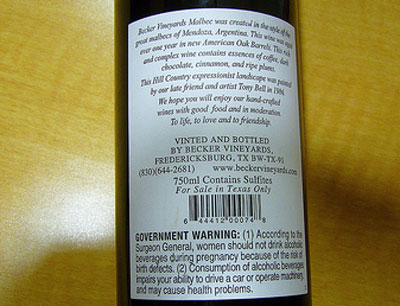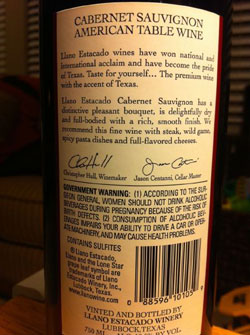
Dear Whole Foods Market, Please Remove Non-Texas Wine From Your Texas Wine Display [Redux]
or, “Where are you Grover Norquist when you need a winery to sign a pledge?”
Those of you that have read and perhaps participated in the discussion started by columnist Andy Chalk in the online article of this name on CraveDFW (lick here for link), know that it has sparked quite a lively discussion (or what appropriately might be called an argy-bargy).
I’m now going a step further and calling for Messina Hof Winery, Becker Vineyards and Fall Creek Vineyards to follow their large Texas winery brethren, Lubbock’s Llano Estacado Winery, and drop the use of the confusing term “For Sale in Texas Only” for their non-Texas wine in favor of the use of American appellation. Where are you Grover Norquist when you need a winery to sign a pledge?
My edited response to Slinwood on Andy Chalk’s blog on CraveDFW posted early today is below…
The situation cited by Andy in Dry Comal Creek is just one example. But, if you go to just about any wine retail location in Texas (Kroger, Randalls, HEB and Trader Joes (to name just a few that sell a significant volume of wine from Texas wineries), you will mostly see wine from a few Texas wineries (mostly the major labels) that have the unfortunate appellation-less label moniker “For Sale in Texas Only”. As both Andy and I have said is that in most all cases, these FSITO wines are legally sold appellation-less by the federal labeling laws (from www.ttb.gov) and composed of by-and-large mostly non-Texas grapes are sold under nearly the same labels these same wineries use for their Texas appellation wines at their wineries. This is confusing at least, and at most, disingenuous, but nevertheless outrageous.
As you said, “What about Becker Vineyards’ Chardonnay, Iconoclast, and Malbec wine labels which state “For Sale in Texas Only”? What about Fall Creek’s Cabernet Sauvignon wine label which states, “For Sale in Texas Only”? What about McPherson’s Sangiovese wine label which states, “For Sale in Texas Only”? What about Messina Hof’s Pinot Noir, wine label which states, “For Sale in Texas Only.” As you can see, there are many renowned wineries on this list.”
Yep, there are many that play this charade with Texas wine consumers, and they don’t have too!
I have to hand it to Llano Estacado, they have stopped using FSITO and provide honest information when their non-Texas wine is labeled as American appellation wine. I just wish that more Texas wineries would accept the same policy.
I understand completely that there are certain and important reasons why Texas needs to import grapes/wine from other appellations. The first reason is price point (Texas grapes are more expensive than other states that have much higher volume and lower cost to produce). The second reason is the weather (this year is an example of a quadruple whammy of spring freezes that dropped grape production in Texas to 10-30 percent in some areas). However, using the veil of FSITO only acts to confuse consumers that want a true Texas appellation wine and blurs the issue to the point that some wineries bring in cheap out of state grapes and charge premium prices and often use misleading statements and confusing labels to sham Texas wine consumers.
I agree wholeheartedly that the people that work to grow Texas grapes and make true Texas wines are people of grit and determination and they have my deep respect. (See and read: http://wineslinger.net)
While you are right that the beef is with TTB at the federal level of government. You know how it is to try to change federal law as a single party particularly when large CA wineries like Gallo and Kendall Jackson would flight long and hard, tooth and nail, and with deep pockets against you. Andy is simply making the pitch to the consumer to make and informed decision. They need to know what FSITO IS and ISN”T…and, in my book, it ain’t Texas wine, not by a large margin!
Russ


Whole Foods needs to focus on taste and profits, not local bravado.